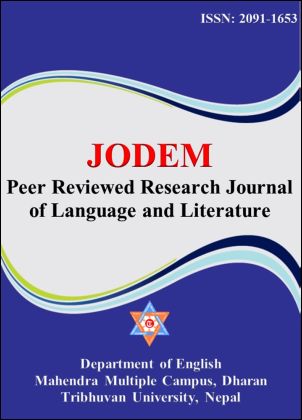Creating the Discourse of Marginalized Limbu Community: A Foucauldian Analysis of Manglak’s Limbuni Gaaun [The Village of Limbu Woman]
DOI:
https://doi.org/10.3126/jodem.v13i1.47462Keywords:
Cultures, discourse of the marginality, Limbu community, marginalizedAbstract
This paper attempts to analyze the poems “Limbuni Gaaun” (“The Village of Limbu Women”), “Aadaangme” (“My Honor”), “Limbuni Maayaa” (“Limbu Woman’s Love”), and “Diplomyaat Devataa” (“Diplomat God”) which are selected from Raj Manglak’s Limbuni Gaaun [The Village of Limbu Woman], the collection of Nepali poems. The poet portrays the day-to-day life experiences and cultures of the marginalized Limbu people who live in the eastern region of Nepal, particularly in hilly districts of Taplejung and Panchthar. This paper aims to explore the same Limbu people’s world and cultures. This study discusses the articulation of the lifestyles, socio-cultural rituals, values, and traditions of the ethnic Limbu community that form a discourse of the marginality to claim the identity and defines the body of knowledge, e.i. the knowledge about the world and culture of Limbu community. Michel Foucault’s concept of discourse has been used as theoretical tool to interpret the selected poems, and achieve the set objectives of this study. Foucault argues that discourse is a systematic way of expression that produces and defines a body of knowledge. From this theoretical stand, the selected poems have been analysed as the discourse of the marginalized Limbu people and culture that exposes and expresses the outshined world of the same community and the distinctive body of knowledge. This study gives insights to understand the marginalized world and cultures of the Limbu community in Nepal.
Downloads
Downloads
Published
How to Cite
Issue
Section
License
© Department of English, Mahendra Multiple Campus, Dharan, Nepal

